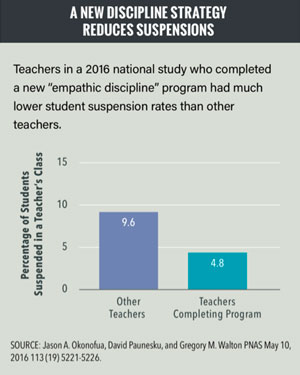We talk a lot about shaping student mindsets for learning, but equally important, is the role that teachers play in students’ psychological experiences of motivation and schooling. In a new report titled, “Teacher Mindsets: How Educators’ Perspectives Shape Student Success,” Georgetown University’s FutureEd explores the ways that teachers can strengthen students’ investment in learning. It begins with building student-teacher relationships, which are critical to academic success, and essential in supporting students who face multiple barriers to learning.
To prioritize cultivation of student-teacher relationships, schools can:
- Adjust the school’s structure or schedule to forge stronger connections. This can include advisories with small groups of students, parents, and teachers extended over multiple years; cohorts of students taught by a team of core academic teachers; and one-on-one mentoring by adult volunteers.
- Arrange home visits to help teachers connect with students and their families. These visits also allow teachers to gain awareness of the student’s context and culture. Parent-Teacher Home Visits offers a successful, evidence-based model. These visits can also help improve attendance.
To help students develop confidence as capable and successful learners, teachers need to:
- Examine their own beliefs about intelligence and the learning process. This is especially true in math instruction. There’s a pervasive myth of the “math person,” in which only certain people can master the subject, and research suggests it’s important to tackle this myth. Complex Instruction offers a model in which teachers help students work in small groups on challenging and open-ended math tasks.
- Give effective feedback to students ensuring that they know their worth. This is particularly important for students who struggle, who can construe criticism of their work as a sign that a teacher is biased or doubts their intelligence. To combat this outcome, teachers should provide “wise feedback” by conveying high standards and assuring students they can meet them.
- Connect new information to what students already know and have experienced. Research shows that connecting learning to students’ culture, interests and prior knowledge not only builds greater student interest in academic work, but also creates a stronger bond between students and teachers.

- Shift mindsets toward an emphatic discipline model. Harsh approaches, or a perception that discipline is unfairly meted out, can cause students to disengage and ratchet up classroom misconduct. Training can shift teachers from a punitive frame to a more empathy-driven approach. Research shows that such efforts can reduce suspensions, especially for students of color.
Our report profiles several schools in the forefront of this work. These schools have begun using our findings on teacher mindsets to shift adult beliefs and behaviors in ways that strengthen students’ view of themselves as learners and their motivation to learn.
This year, why not try a new approach and see what happens!








